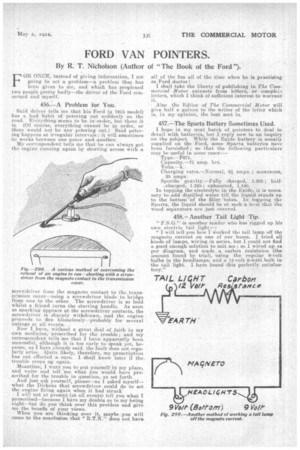FORD VAN POINTERS.
Page 29

If you've noticed an error in this article please click here to report it so we can fix it.
By R. T. Nicholson (Author of" The Book of the Ford ").
FOR ONCE, instead of giving information, I am' going to set a problem—a problem that has been given to me, and which has perplexed two people pretty badly—the driver of the Ford concerned and myself.
456.1-A Problem for You.
Said driver tells me that his Ford (a 1915 model) has a had habit of petering out suddenly on the road. Evc-rything seems to be in order, but there it is. (Of course, everything cannot be in order, or there would not be any petering out.) Said petering happens at irregular intervals; it will sometimes be weeks between one peter and another.
My correspondent tells me that he can always get the engine running again by shorting across with a
screwdriver from the magneto contact to the transmission cover—using a screwdriver blade to bridge from one to the other. The screwdriver is so held whilst a friend i.urns the starting handle. As soon as sparking appears at the screwdriver contacts, the screwdriver is sharply withdrawn, and the engine proceeds to fire blamelessly—probably for several outings at all events.
Now I have, without a great deal of faith in my own medicine, prescribed for the trouble; and my correspondent tells me that I have apparently been successful, although it is too early to speak yet, because, as I have already said. the fault does not replady arise. Quite likely, therefore, my prescription has not effected a cure. I shall know later if the trouble crops up again.
Meantime, I want you to put yourself in my place, and write and tell me what you would have prescribed for the trouble in question, as set ferth. And just ask yourself, please—as I asked myself— what the Dickens that screwdriver could do to set the engine firing again when it had struck I will not at present (at all events) tell you what I prescribed—because I have my doubts as to my being right—but do you think over this problem and give me the benefit of your views. When you are thinking over it, maybe you will Come to the conclusion that " R.T.N." does not have all of the fun all of the time when he is practising as Ford doctor
I shall take the liberty of publishing in The Commercial Motor extracts from letters, or comple;.2 letters, which I think of sutflcient interest to warrant it.
Also the Editor of The Commercial Motor will give half a guinea to the writer of the letter whitth is, in my opinion, the best sent in.
457.—The Sparta Battery Sometimes Used.
I hope in my next batch of pointers to deal in detail with batteries, but I reply now to an inquiry on the subject. While the Exide battery is usually supplied on the Ford, some Sparta batteries have been furnished; so that the following particulars may be useful in some cases:—
Type.—F671. Capacity.-71 amp. bra.
Charging rates.—Normal, 6i amps. ; maximum, 25 amps. Specific gravity.—Fully charged, 1.95; half,charged, 1.225 • exhausted, 1.140. In topping the electrolyte in the Exide, it is necessary to add distilled water till the liquid stands up to the bottom "of the filler 'tubes. In twping the Sparta, the liquid should be at such a level that the wood separators are just covered.
458.—Another Tail Light Tip.
"F.S.G.",is another reader who has rigged up his own electric tail light :—
' I will tell you how I Worked the tail lamp off the magneto current on one of our buses. I tried all kinds of lamps, wiring in series, but I could not find a good enough solution to suit me ; so I wired up as per diagram, and made a carbon resistance the amount found by trial), using the regular 9-volt bulbs in the headlamps, and a 12-volt 6-watt bulb in the tail light. I have found this perfectly satisfactory."
































